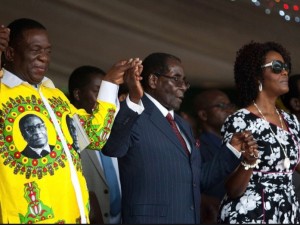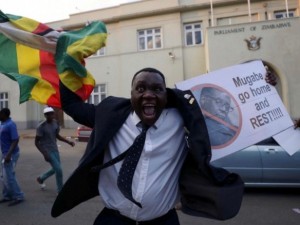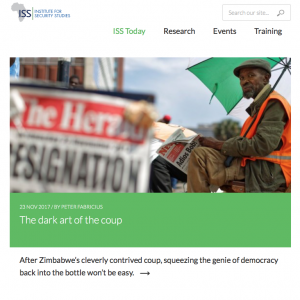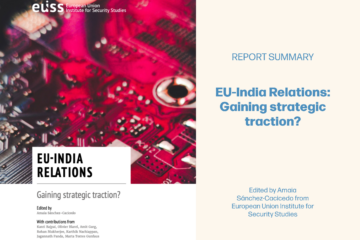The dark art of the coup
[:en]By Peter Fabricius (ISS)
In a series of articles, the Institute for Security Studies (ISS), has followed and analyzed closely the developments in Zimbabwe. Under their daily updates on Africa’s current issues, ISS has reported both the current state in Zimbabwe as well as political projections. Especially, there is great focus on the meaning of the military coup, which ISS authors argue it was more of a staged operation rather than an actual coup. As Zimbabweans celebrate what seems to be the beginning of democracy, the international actors could play a key role in ensuring democracy.
Peter Fabricius, ISS Consultant, describes through a time-line of the events what is a stake in Zimbabwe and how these past weeks might very well be the most important for the country’s future. The military seized control on Tuesday night, 14 November and by 21 November, Robert Mugabe had resigned after 37 years as president. This seemingly fast and easy “coup” graciously avoided bloody confrontations, and brings analysts to question whether it was indeed a coup or just a planned move puppeteered by Mnangagwa, who is taking over Zimbabwe’s presidency for the time being.
Now, Zimbabweans and the international spectators are expecting that Mnangagwa will put in place the necessary resolutions to construct a legitimate and democratic government. As a matter of fact, there is already speculation about whether next year elections will run and if they will run smoothly on the right direction. In that sense, there is some expectation from international donors and creditors to ensure free and fair elections by making their financial flows to the country conditional on the respect of the constitution.
Finally, there is talks about the key role the US can play in Zimbabwe’s political future by easing or removing sanctions to relieve Zimbabwe’s weak economy. With the US being a primary member of international financial institutions such as the World Bank and the International Monetary Fund, there is some hope for debt relief. The potential instability of Zimbabwe is of concern to neighbors and the world in general, but now it is a matter of waiting to see what democracy will look like in the Zimbabwean context.
Read more here:
In a series of articles, the Institute for Security Studies (ISS), has followed and analyzed closely the developments in Zimbabwe. Under their daily updates on Africa’s current issues, ISS has reported both the current state in Zimbabwe as well as political projections. Especially, there is great focus on the meaning of the military coup, which ISS authors argue it was more of a staged operation rather than an actual coup. As Zimbabweans celebrate what seems to be the beginning of democracy, the international actors could play a key role in ensuring democracy.
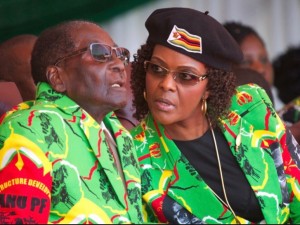 Peter Fabricius, ISS Consultant, describes through a time-line of the events what is a stake in Zimbabwe and how these past weeks might very well be the most important for the country’s future. The military seized control on Tuesday night, 14 November and by 21 November, Robert Mugabe had resigned after 37 years as president. This seemingly fast and easy “coup” graciously avoided bloody confrontations, and brings analysts to question whether it was indeed a coup or just a planned move puppeteered by Mnangagwa, who is taking over Zimbabwe’s presidency for the time being.
Peter Fabricius, ISS Consultant, describes through a time-line of the events what is a stake in Zimbabwe and how these past weeks might very well be the most important for the country’s future. The military seized control on Tuesday night, 14 November and by 21 November, Robert Mugabe had resigned after 37 years as president. This seemingly fast and easy “coup” graciously avoided bloody confrontations, and brings analysts to question whether it was indeed a coup or just a planned move puppeteered by Mnangagwa, who is taking over Zimbabwe’s presidency for the time being.
Now, Zimbabweans and the international spectators are expecting that Mnangagwa will put in place the necessary resolutions to construct a legitimate and democratic government. As a matter of fact, there is already speculation about whether next year elections will run and if they will run smoothly on the right direction. In that sense, there is some expectation from international donors and creditors to ensure free and fair elections by making their financial flows to the country conditional on the respect of the constitution.
Finally, there is talks about the key role the US can play in Zimbabwe’s political future by easing or removing sanctions to relieve Zimbabwe’s weak economy. With the US being a primary member of international financial institutions such as the World Bank and the International Monetary Fund, there is some hope for debt relief. The potential instability of Zimbabwe is of concern to neighbors and the world in general, but now it is a matter of waiting to see what democracy will look like in the Zimbabwean context.
Read more here:
